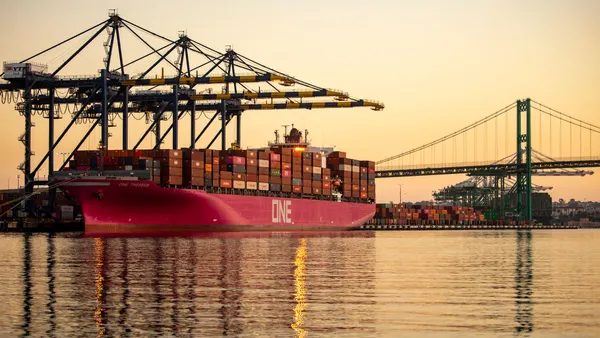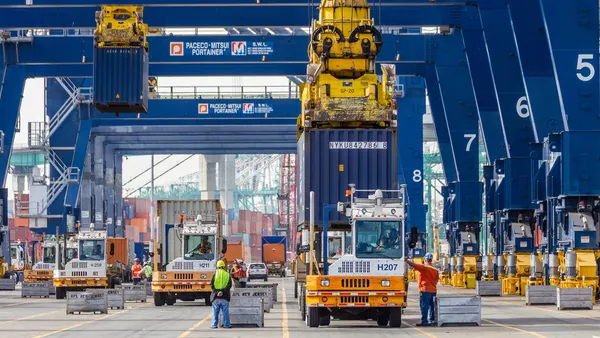Dive Brief:
- The Federal Maritime Commission is investigating claims that ocean carriers are billing third-party companies not listed in the original contract for transportation fees. This includes the collection of freight rates, equipment charges, and detention and demurrage, which they "may not legally be required to pay," the agency said Wednesday.
- The inquiry is specifically looking into how carriers have applied the term "merchant" in their bills of lading. The FMC received complaints that the ocean carriers sought payment from third-party logistics providers, harbor truckers, stevedores, customs brokers and freight forwarders that "have no connection to the cargo or the shipment, other than providing services" to the company listed in the bill of lading, the agency said.
- The FMC seeks comments from stakeholders until Nov. 6. Full instructions for submitting comments are in the Notice of Inquiry.
Dive Insight:
The FMC's investigation comes as a result of comments in response to a notice of proposed rulemaking on demurrage and detention the agency released last year.
Agriculture Transportation Coalition Executive Director Peter Friedmann was one of the commenters who laid out these concerns for the agency in an October 2019 letter. Ocean carriers will sometimes lock out trucking companies with which they have no contractual relationship in an attempt to get payment, Friedmann wrote, arguing that detention and demurrage should be charged to importing or exporting companies, not third-party transportation providers.
"Bullying isn’t supposed to be in vogue anymore," Friedmann said in his letter last year. "So why does the Commission allow it here?"
The FMC decided against issuing guidance on billing practices in its final interpretive rule on demurrage and detention. But this inquiry shows the agency is now looking into the concerns highlighted last year.
"General contract law principles provide that one party cannot enforce a contract against another who did not assent to be bound by its terms and conditions," FMC Secretary Rachel Dickon wrote in the inquiry notice. "This can include situations where one party attempts to bind another party with unilaterally defined terms."
The term "merchant" is important because whatever company is determined to be a merchant in a bill of lading could be on the hook financially with the ocean carrier for detention and demurrage, according to a blog post from Arnold van Steenderen, a shipping industry lawyer with Mainport Lawyers in the Netherlands.
The FMC wants to determine if the term is being unfairly applied to companies that don't have a contract with the ocean carrier. The agency will also ask ocean carriers for details on how they define "merchant."
New York/New Jersey Foreign Freight Forwarders and Brokers Association President William B. Skinner wrote a letter to the FMC last year, saying the term is currently applied too broadly and can include the "Shipper, Consignee, owner, Person owning or entitled to possession of the Goods or of this Bill, Receiver, Holder, and anyone acting on behalf of any such person, including but not limited to agents, servants, independent contractors ... and freight forwarders."
Skinner gave the example of a customs broker facing nearly $1 million in demurrage and detention costs "because their name happened to be erroneously placed in the consignee box on the steamship line bill of lading."
This issue of demurrage and detention was underscored this year as the pandemic snarled supply chains. Multiple companies contacted the FMC to say carriers were abusing the practice during the pandemic.
Adidas Senior Vice President for Supply Chain Management in North America Joseph Godsey wrote to the FMC in April about lockdowns in supplier countries and shipping issues.
"The imposition of detention and demurrage charges when equipment cannot be returned or containers cannot be picked up during the free period, for reasons beyond my company’s control, especially in this time of crisis, is not only inherently unfair, but makes my company’s products more expensive for consumers, at a time when they can least afford it," Godsey wrote.
Walmart wrote a letter to the FMC in October 2019 acknowledging that demurrage and detention were appropriate tools for incentivizing cargo movement, but said there does need to be clarity around who is liable for the fees.
"We encourage ocean container stakeholders to share their experiences with bills of lading that contain these described 'Merchant' clauses," FMC Chairman Michael Khouri said in a statement. "Without public comment and involvement, it is difficult for the Commission to address alleged commercial abuse in this area."












